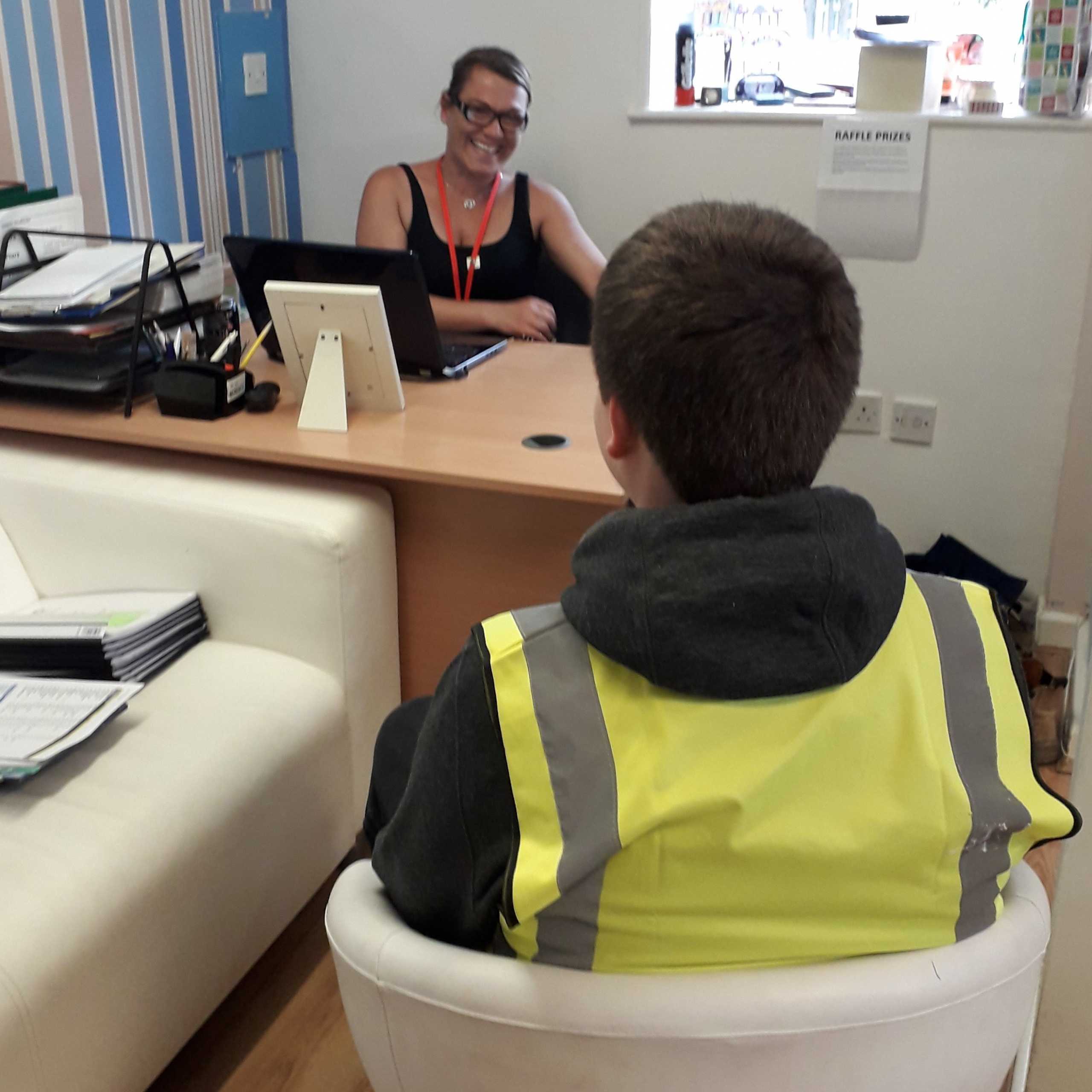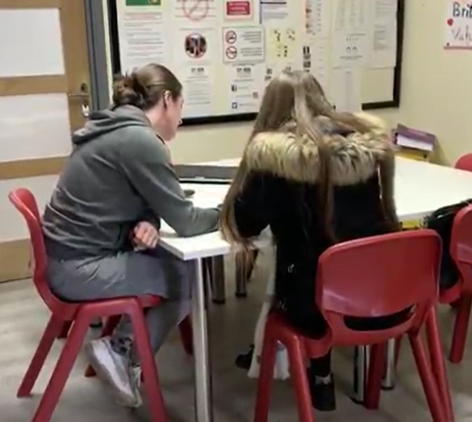Much is being said, and indeed broadcast about post-pandemic Mental Health (MH) issues, but the messages are mixed. As a result of the pandemic there has been a considerable rise in MH issues. According to The Health Foundation, worry about the future and feeling stressed or anxious are among the most common issues affecting wellbeing. Naturally, this has also led to an increase in MH concerns among the young people at our Alternative Provision (AP). As a result, we have had to increase the support we give.
The St Edmunds Society welfare team saw the number of interventions they conduct increase by 320% from Jan/Feb to Mar/Apr. Many of these interventions were providing support around MH and isolation for our young people. Social isolation, anxiety and depression were the key concerns coming out of sessions with students after lockdown.
A Young Minds study found that 67% of 13-25 year olds believed the pandemic will have negative effect on their MH long-term. Where the percentage of our students who had good coping strategies and positive MH was the majority, it is now the minority.

“I want these thoughts to stop. I don’t know how to cope with my problems, and I don’t feel like I have anyone to talk to.”
Student – St Edmunds Society
Mental Health Support in Mainstream Education
The government are investing heavily in MH services across the UK. Gavin Williamson announced more than £17 million in funding to improve Mental Health and wellbeing support in schools and colleges during May’s Mental Health Awareness week. This is to help the recovery from the pandemic and the funding will be used to train senior MH leads in schools. We recognise that this is extremely vital support for young people. However, it fails yet again to identify support for those young people who attend an AP, many of whom are at risk of, or suffer with MH. This government support will only partially tackle the MH crisis among young people nationally. It neglects to acknowledge those in AP, who are often placed there because MH prevented them from accessing or participating in mainstream education in the first place.

“The focus in a mainstream school is achieving academic qualifications. Students who are not able to engage in this style of learning are cast aside as inferior and they are left feeling outcast and isolated from their peers.
Many schools do not acknowledge intelligence in other forms, so those students internalise that feeling of being inferior. By the time students come to our AP, they have felt this way for a long time. Those feelings are hard-wired.”
Rio Bygrave, Welfare Support Manager at St Edmunds Society
Charity Support for Mental Health
As a charity, we rely heavily on charitable donations and grants to continue to offer our services. We have been turned down for fundraising applications time and time again as we do not ‘meet the criteria’. Recently, this was because the young people we work with do not have ‘severe Mental Health issues’. We do not believe this to be the case, as self-harm and suicidal thoughts are common among our students.
“Self-harm will often be a coping strategy that a young person has used for a long time and has become a comfort. With issues like this we support with external referrals. We offer the young person a lot of time and nurture. When a student reports having suicidal thoughts, we ensure they feel listened to, and show them that we are proactively seeking support for them. We are able to make them feel validated.”
Rio Bygrave, Welfare Support Manager at St Edmunds Society
Our welfare team are able to support students who reach out to them. They are often able to spot the signs of MH early. We look to provide support around prevention of a MH crisis, rather than a reactive approach. It is frustrating to be told that the MH issues we work with are not ‘severe’ enough for funding, when the work we do is to mitigate MH issues at an early stage and prevent these young people from reaching crisis point in the first place.
Furthermore, we have been turned down for funding as we are not providing open access to MH support for the community, as we are a school-based service. However, when it comes to government funding, we are not classed as a school and therefore not eligible for this funding either.
Services in Norfolk
Currently, the waiting lists for counselling in Norfolk is 18 months or longer. During this wait, young people are feeling lost, helpless and let down by the system they rely on. Our welfare team support every young student with their wellbeing, but external support is only available for these young people when their needs are critical, and they are a risk to themselves. Whilst on the waiting list we often see young people desperate for help and their needs escalate due to not receiving the right level of treatment when it is necessary.

We desperately want to better support these young people at St Edmunds Society, instead of referring them to other agencies. As a universal service, supporting students with higher MH needs has become normal and regular, yet as a charity the funding and training to allow staff to do this effectively isn’t there.
Mental Health in Alternative Provision
Sadly, it is an inescapable fact that many of our students originate from disadvantaged families, have poor educational attainment or are living in poverty. These Forgotten Children are usually marginalised, often vulnerable and can at times be exploited and coerced into criminal exploitation. Many see themselves as failures without any academic prowess and a disengagement with society through their lack of educational achievement.
High levels of Mental Health in our Alternative Provision can originate from:
- Social Exclusion – these young people have not been in school long enough to form friendships. They are not able to form peer relationships due to low self-esteem or forming them online, so they feel isolated and are more vulnerable to exploitation and grooming.
- Feeling of Rejection – they are often made to feel rejected or not good enough at school, due to not achieving qualification.
- Toxic Masculinity Culture – young males are taught to ‘be a man’ and ‘don’t show weakness.’
- Young Carers – higher levels in Alternative Provision, often lead to knock on effects of social exclusion.
- Safeguarding Issues – higher levels create problems with students’ behaviour and poor coping strategies, leading to schools not being able to manage behaviour, which leads to poor MH.
- Perception of AP – students believe that by attending alternative education they are ‘stupid’ or go to ‘a naughty school’. These thoughts often lead to low self-esteem.
- Traumatic Experience in School – bullying/anxiety around being singled out as a ‘naughty child’. This can lead to anxiety around attending a school and pattern of avoidance.
St Eds Welfare Team
Our staff spend a lot of time unpicking the safeguarding concerns that young people demonstrate in their behaviours. Each category of abuse comes with short-term and long-term effects. The ‘lost generation’ are currently growing up with these behaviours. As a result they are outcast as being ‘a problem child’. In a critical time where self-image and self-understanding are being distorted, this has a massive impact on their MH.
“Lockdown was like pushing ‘a reset switch’ on the work I had done on improving my Mental Health and self-esteem.”
Student – St Edmunds Society
Sadly, hearing this in our AP is not uncommon. For those who were already struggling, lockdown unravelled their routine and made it hard to access the things they did pre-lockdown. Many have struggled to adapt from isolation back into a routine, back into crowds and being around their peers. The stresses around achieving vocational qualifications, despite long periods of working from home, out of a vocational environment have also had a massive impact.
Disadvantaged young people could be worst affected as a result of the COVID-19 crisis. The most important thing is to raise awareness for these young people and ensure no child is left behind. We have to change people’s mindsets and make them understand that every child matters. Addressing this issue is vital because nobody else provides for them. It will benefit the entire community to support these young people, both now and longer-term.
‘Levelling Up’ applies to all, especially those struggling in education and struggling to find their place in society.
Help Us to Help Them
If you want to support these young people, you can make a donation to St Edmunds Society by visiting www.paypal.com/gb/fundraiser/charity/3223483.
Perhaps you would be able to donate some of your time? We always have volunteer opportunities available. Please Contact Us for more information.
